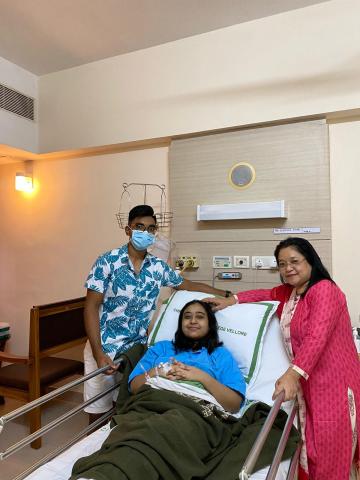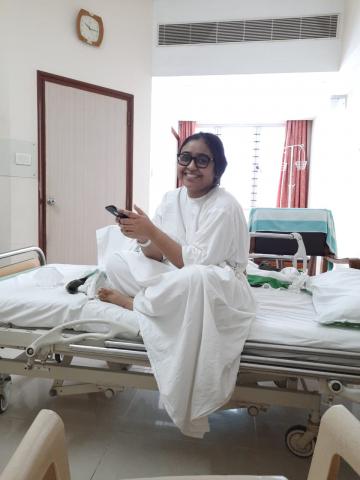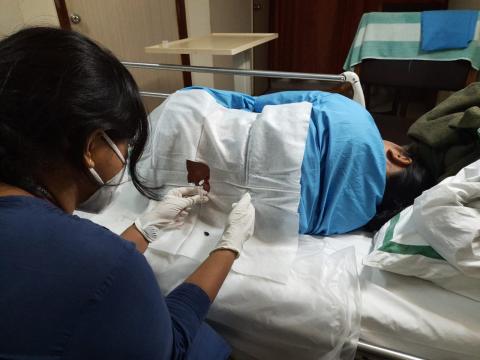
Suzanne Sangi, 26, was diagnosed with a rare neurological condition called Idiopathic Intracranial Hypertension causing severe headaches, ringing in her ears with a daunting possibility of going blind. Here she talks about her treatment and renewed will to live thoughtfully and hopefully.
I often wondered to myself, things couldn’t get any worse than they were -- I’d been living with a chronic illness called Lupus for more than three years now. My kidneys had been aggressively damaged and I’ve been well on my way to renal failure (which I hope to stall for a couple more years). And I have had made peace with that - the treatments, hospitalizations and life-long medications. And then something strange and painful took me completely by surprise last November in 2021.
It was just two days before my birthday, and I was all set to spend my twenty-fifth at a cozy farmhouse just beyond the city.
That evening, the headaches began.
Strange symptoms and excruciating pain
The headaches were nothing like I’d ever had before. The pain spread across my skull -- hammering into my head, flashing across in sudden spasms, digging into my skull like a drill. Painkillers wouldn’t work. And then I noticed that my vision began blurring and I started hearing a deafening whooshing sound in my ears that kept time with my pulse, like a gust of wind beating rhythmically against my ears (a phenomenon called “Pulsatile tinnitus” as I would come to learn later on, quite different from the common ringing sound of tinnitus). Everything felt warped and echoey and scary.
The pain was constant, so I knew that something was deeply wrong. I became extremely sensitive to the slightest lights and sounds. For nearly two weeks I’d fall asleep only when my mom massaged my head, and I’d sleep for about three to four hours at best.
Then my mother and I decided to visit a hospital. After a thorough examination, I was told that my optic nerve was swollen and I would need a brain MRI to check for clots in my brain and also get a thorough eye check-up. I was also asked to get admitted to the hospital soon for a procedure called Lumbar puncture to check the pressure of my cerebrospinal fluid.
We returned home that night and I went to bed in excruciating pain, despite the medication. After midnight, I called my best friend and asked her to talk to me, to distract me from the pain; I smiled through silent tears as she fumbled through random topics to keep the conversation going.
Diagnosis and deteriorating vision
Finally, I was admitted to the hospital and a team of doctors descended on me. Multiple investigations later, it was determined that I had a rare neurological condition called Idiopathic Intracranial Hypertension (IIH) caused by sudden increase of pressure in the cerebrospinal fluid that runs through the brain and spinal cord. The pressure had caused my optic nerve to swell and at this point, my vision had disturbingly deteriorated -- things appeared extremely blurred, straight lines would slant or appear concave, I was seeing things double although my eye power had not changed. There was a daunting possibility of going blind if I didn’t respond to treatment. I was deeply frightened.
Any link between IIH and Lupus?
I wondered if my IIH was linked to my Lupus in anyway. But learnt later that the term Idiopathic Intracranial Hypertension itself explains that there is no specific known reason why high cerebrospinal fluid (CSF) pressure occurs. It could be various things. It could be due to my strong immunosuppressive drugs or heavy dose antibiotics. It could have been due to Lupus also. Who knows? There is no direct link to anything that we can be certain of.
Treatment and medication side effects
I had to undergo a procedure called Lumbar puncture two times in the hospital. Lumbar puncture is also called spinal tapping where a needle is inserted between the bones on the lower spine. Besides measuring the pressure of my cerebrospinal fluid (CSF), some of it was also drained out to test it for infections and also to bring down the pressure. The first attempt was extremely painful and wasn’t successful, my body started convulsing involuntarily which was later diagnosed as Psychogenic non-elliptic seizures, a rare response to distress.
I was also put on the medicine Acetazolamide (diamox as commonly used) to drain out the CSF which so far has been the most difficult medication to cope with. The side effects were terrible -- weeks of indigestion, acidity, nausea, dizziness, vomiting, the worst brain-fog I’ve ever had, and such extreme fatigue that I had to stay in bed for days.
Complications in Lupus management
It definitely did create complications in my Lupus management. Acetazolamide (used to decrease the pressure in the eye) is a very strong diuretic and it raised my creatinine level, which was already in a dangerous place because of my Chronic Kidney Disease (CKD). That is why my doctor tapered it down quite fast. I think for the first two months I was given the highest dosage and then slowly month by month it was tapered off as my symptoms got better because it was definitely harming my kidneys and putting pressure on it a lot more.
Also the medication pushed down my potassium levels aggressively. I was given some medicines and syrups to increase my potassium count. I also began taking coconut water everyday to naturally maintain my potassium during that time.
So in a way IIH did cause some complications with my Lupus and Chronic Kidney Disease management. And because of that my doctors had to constantly keep my electrolytes and blood pressure in check.

Weight loss for IIH cure
Over a few months, the dosage was brought down and I began focusing on a stringent diet for weight-loss which is the only permanent treatment for IIH in most cases, as my doctors emphasized repeatedly. Even a 3% loss of weight would reduce risk of relapse of IIH. My vision had also improved, monitored with regular eye check-ups, and the paralyzing fatigue also went away once the medication was stopped.
Read also: Kavya's experience with IIH (Idiopathic Intracranial Hypertension)
Healthy diet improved Lupus and CKD
I healthy diet definitely had a positive impact on my Lupus and CKD. This might sound strange but in many ways, I believe IIH was a useful intervention in getting a healthy diet and self-care priorities back in place, despite how scary it was. The journey of pain and healing was not new for me, but it was a reminder to ground myself in the things that truly matter to me.
Earlier, I wasn’t as mindful about my diet. Although I knew that there were certain things I had to keep away from, for example my cheat days were many. The mindset was not as proactive as it is right now.
A healthy diet has had like a double beneficial effect on me. It helped me better manage both the IIH and the CKD. My kidney symptoms have also actually reduced because my food intake has become so much cleaner. Now I have just removed all processed food, dairy and red meat and caffeine, sugars as much as possible. It has also been a really good incentive to keep a check of my weight, because if I put on weight, I could go blind due to a recurrence of IIH.
So now there are many more acute reasons to stick to a much healthier lifestyle. It had to be something like IIH that put a good perspective regarding health and kidney care. And most importantly, it renewed my will to live thoughtfully and hopefully -- and that’s really all anybody ever wants right?
Suzanne Sangi has previously written
My Relationship with an Invisible Illness - Lupus
Creating A Patient Led Holistic Support System For Lupus in India
(Suzanne Sangi is a writer, singer-songwriter and Cultural Studies enthusiast. Her book 'Facebook Phantom' published when she was 17 was featured on The Hindu newspaper. She writes in many spaces and has published articles about politics, faith, social movements and pop culture in The Scroll, The New Indian Express, and other national journals. She currently works as a content marketing manager at a start-up.)








